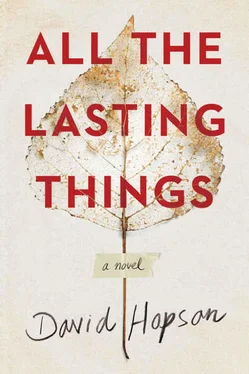Why, thirty-one years later, Benji found himself back on those thick, powerful shoulders, wanting the apple that hung above him, was a mystery to him. He hated his father. Or claimed to. And it wasn’t an apple that now caught his eye. It was a pinecone. But the desire persisted. The desire won. Benji wasn’t sauced enough or stupid enough or, as he was currently dressed, flexible enough to climb onto the three-inch-wide railing and stretch to his most harrowing limits. But his veins surged with the dangerous conviction of his own ingenuity. A brief search of the nearby ground turned up a long, tapering branch that, in concert with the suit of armor, looked something like a pronged lance he intended to use to pull in his prize. But lashing the branches together soon seemed as likely as Cat McCarthy falling into him with that slow, soft kiss. He reevaluated. If he wedged his feet between the damp black balusters and stood on the bottom rail, he’d gain another five, maybe six inches and get the height and leverage he needed to knock his prize free with one hand and catch it with the other.
He blinked against the spinning world, waiting until he felt adequately focused, then sliced the lance through the air. He missed. Swung again like a one-armed man attacking a birthday piñata. And missed. He missed and missed and missed and hit too high and sent nothing but a shower of pine needles raining down and then missed again. Leaning out as far as he dared, he ignored the burn that threatened to unhinge his shoulder. His stomach muscles strained with the added weight lashed to his torso, but he steadied himself with a long, stabilizing breath that would have made Hamlet proud and swung his stick through the air.
The branches connected with a dry thwack. The pinecone let go. A thrill of attainment, a little nightbird of joy, soared for a split second through Benji’s heart. After that, it became clear that his calculations, compromised by his blood alcohol level and a more general lack of spatial intelligence, were hopelessly off. The pinecone missed his hand by a good two feet and dropped, regardless of his desire, without ceremony, into the waiting maw of the pitch-black ravine. Benji let his lance drop, waiting for the soft sound of its landing far below. He stepped off the railing and, though he knew himself to be alone, looked searchingly into the darkness around him.
How different he might have felt had somebody been there, not the applauding audience he usually imagined as the world’s only worthwhile comfort but a single interested person to ask him his trouble. He waited. Like Hardy’s Jude, the reckless dreamer and college dropout to whom Henry often compared him, Benji waited for someone to come, but nobody did. Nobody did, because nobody does. Not that another person would have known what to make of Benji’s trouble.
Benji stepped back onto the railing. Slowly, he raised his arms from his sides. He looked, he imagined, like Kate Winslet on the prow of the Titanic , if Kate Winslet had been dressed for the Thirty Years War, although his stance indicated not an embrace of the world but a challenge to it. Fuck everybody. Fuck everything. He leaned against the wooden rail with the full force of his weight, daring the universe to deliver its final insult, daring the banister to break. When it didn’t, Benji laughed, a spark of amusement that his quickening breath soon beat into a hot, angry flame. I can’t even do this right . He brought the mad laughter to a stop with a loud, growling scream. Fuuuuuck! The sound, a better purgative than puking, made a violent tear in the quiet of the woods. No one heard it. No one heard the word, or the faint echo of it whispering back through the trees, or — there it was: finally, at last — the splintering rail exploding with a crack so sudden, so extreme, the wood seemed to be voicing some argument it had stifled for far too long. No one heard any of it, including the sound of a man, too stunned to call, falling headlong into the dark.
Jane. Jane. Jane. Jane. Jane. Jane. Jane. Jane. Jane. Jane. Jane. Jane. Jane. Jane. Jane. Jane. Jane. Jane. Jane. Jane. Jane. Jane. Jane. Jane. Jane. Jane. Jane. Jane. Jane. Jane. Jane. Jane: I walk with the others, calling her name through spruces and pines and skeleton trees sleeved with snow. I call until my boots freeze. I call until I can’t feel my hands. I call until there’s no voice left to call with. I call until I taste pennies in the back of my throat. I call when the sun sets and call again when the sun rises. I call with freezing fists of white jabbing from my mouth to batter the air. I call because nothing is right in the world, because nothing will ever be right again. I call because calling is all that’s left. I call after the others go home.
Claudia followed the social worker out of the emergency room. They took the quickest route, braving the gauntlet of wheelchairs and gurneys and beeping, hissing machines, where the challenge for Claudia was finding someplace safe to look. Her eyes were drawn to the tableaux happening on the other side of the dividing curtains — the moaners, the bleeders, the hopelessly bored — and she struggled to keep her attention on the backs of the social worker’s shoes.
They walked briskly along, past the buzzing hive of the nurses’ station, past radiology, through one set of automatic doors after another, until they came to a lounge at the end of a long, antiseptic hall.
The room was stifling, filled with pressed-wood furniture and the milky-gray light that seeped between crooked blind slats. Crumpled, mostly coverless magazines littered a scuffed coffee table, and the smell of institutional gravy, wafting in from a nearby food cart, clotted the air. The social worker, whose name tag read “Valerie Emerson, CSW,” pulled together two chairs and, with a small, placid smile, sat down.
“Now,” she said, once Claudia had parked her roll-along bag and settled in beside her, “why impossible?” She folded her large, mannish hands on the stacked folders she held on her lap and looked at Claudia expectantly.
“It’s just not something my brother would do.”
Valerie, whose Peter Pan — collared blouse and lightweight gray cardigan suggested to Claudia a modern-day nun, looked unconvinced. She tucked an auburn wave behind her ear and patiently, as if she didn’t have twenty other cases jockeying for attention, began to explain how jumping into a dry streambed seemed to be exactly what Benji had done.
What if he had done it? What if he had?
“Claudia?”
Claudia blinked back a well of tears and squared her shoulders with renewed focus. “You were saying?”
“People in distress,” Valerie began, “sometimes surprise us with their behavior. Do things we wouldn’t expect them to do. Has your brother seemed.” She closed her eyes for long stretches as she spoke and chose her words so mindfully, with such unhurried care, that her sentences sounded snapped in half by silence. “In distress?”
“Ever?” Claudia asked. The word flashed like a blade.
“Recently.”
Two months ago, her brother had given up the one-bedroom apartment in Greenpoint he shared with two other actors and moved three hours north, into a converted toolshed belonging to the assistant director of a ragtag regional theater company. He was thirty-nine years old and brought home $325 a week. Owed MasterCard over $9,000. Owed his sister and mother twice that, easily. Shied from sexual relationships that lasted longer than a hangover. And now had been found, fractured and bruised and drunk, at the bottom of a ravine. He was, in many ways, the definition of distress. Claudia shook her head.
“Has he ever mentioned.” Silence. “Harming himself?”
Читать дальше












